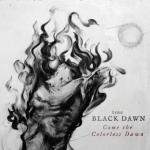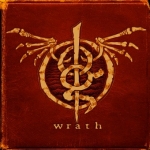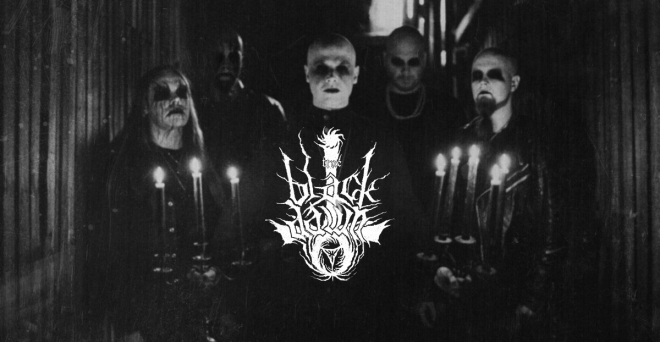
TRUE BLACK DAWN
Wrath

VERSION FRANCAISE
S. : Salut à toi Wrath. Tout d’abord merci de nous accorder cette entrevue. Entrons directement dans le vif du sujet. Le nouvel album de True Black Dawn est sorti le 17 mai, nous l’avons décortiqué sur nos pages (ICI). Mais toi, comment le décrirais-tu ?
Wrath : "There is a pleasure in the pathless woods. There is a rapture on the lonely shore. There is society, where none intrudes. By the deep sea, and music in its roar. " - Lord Byron
S. : Il aura fallu attendre 15 ans depuis la sortie de « Blood for Satan », pourquoi ce sommeil si long ? Que s’est-il passé entre temps ?
Wrath : Après Blood for Satan, nous avons sorti l’EP ”The Boogeyman Unbound”, disponible sur le split avec Enochian Crescent et O. Il a été enregistré en 2003 avec Syphon et BFS, mais à cause de divers problèmes, il n’a pas pu sortir tout de suite. Nous avons également produit quelques morceaux en 2008 avec un line-up différent, mais qui n’ont jamais vu le jour physiquement. Par ailleurs, j’ai été actif avec Enochian Crescent jusqu’en 2012, ce qui a naturellement eu un impact sur Black Dawn.
Je pense que cette absence de sortie a laissé croire que le groupe avait disparu jusqu’à aujourd’hui, alors qu’en vérité nous n’avons jamais splitté. Il y a eu plusieurs line-ups depuis Blood for Satan, dont certains n’étaient pas viables sur le long terme. C’était là le principal problème auparavant. Depuis que j’ai mis un terme à Enochian Crescent, nous avons décidé avec Syphon, qui a de nouveau rejoint le groupe, de devenir plus actif, en apportant du sang neuf au projet.
S. : Qu'est ce qui t'as motivé pour l'écriture d'un nouvel opus de True Black Dawn ? Par ailleurs, est-ce un travail qui a pris 15 ans ou bien, attendais-tu une certaine forme d'illumination pour te lancer dans la composition ?
Wrath : Nous avons commencé à composer cet album à l’été 2012. Peu de temps après que VnoM nous ait rejoint, nous avons enfin trouvé une salle de répét’ via les membres de Lie in Ruins. Une fois ce problème résolu et les répétitions commencées à Helsinki, les choses sont allées plus vite. Plus vite pour un groupe tel que Black Dawn en tout cas, étant donné que ça nous a pris quatre ans, artwork compris.
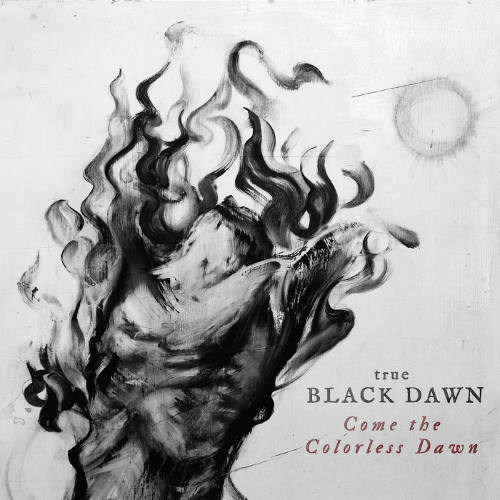
"Come the Colorness Dawn", 2016
S. : En terme d'écriture, quelles sont les principales différences entre les deux albums ? J'entends par là, est-ce le même homme, avec le même état d'esprit qui a écrit les deux opus, ou bien chaque album aborde une facette distincte liée à tes motivations personnelles du moment ?
Wrath : Mises à part les douze années qui séparent ces deux albums, la principale différence est que Blood for Satan avait été composé par Gaunt (ndlr : ancien guitariste de Black Dawn) alors que le nouvel opus l’a été par Syphon et VnoM. Les influences et les orientations furent donc bien différentes, tant sur le plan musical que dans les textes. De l’eau a coulé sous les ponts depuis toutes ces années, et notre naïveté de l’époque a laissé place à quelque chose de plus sombre, quelque chose qui peut s’infiltrer juste sous la peau.
Blood for Satan était plus ”noir et blanc” d’un point de vue conceptuel, délivrant une haine singulière envers l’humanité. Cet album s’apparente plus à des nuances de gris, un vide glacial aspirant des cendres à lui. Ces deux albums révèlent en somme différents aspects de la même bête.
S. : Ce Come the Colorless Dawn apparaît moins brutal que son prédécesseur, plus mélodique et mâture. Il est relativement proche de ce que peut faire Behexen ou Watain. Dans quelle mesure ces groupes de la scène Black Orthodoxe t’influencent-ils ?
Wrath : Pour moi, aucun de ces deux groupes n’a réellement eu d’influence sur notre projet. Cela dit, je considère les membres de Behexen comme nos frères depuis très longtemps. Eux comme nous avons tracé notre voie depuis le début. Nous ne sommes pas tout à fait d’accord sur certains points idéologiques mais nous nous sommes toujours soutenus à travers le temps.
Je pense que les nuances et les oppositions rendent tout plus intéressant et efficace. Quand il y a plusieurs niveaux dans l’obscurité, il est plus facile de se perdre dans les profondeurs.
S. : La qualité de la production est l’un des points forts de cet album, ce qui n’est pas étonnant étant donné qu’il a été enregistré au Necromorbus Studio (Armagedda, Funeral Mist, Ondskapt…). Pourquoi avoir choisi ce studio de renom ? Une volonté d’avoir une production la plus soignée possible ?
Wrath : Il a en fait été enregistré dans notre salle de répétition, avec l’aide de LL de Desolate Shrine, qui a aussi mixé l’album. Nous y avons gagné en liberté au prix d’un allongement du processus de création. Pour le mastering, nous avons choisi le Necromorbus Studio pour leur histoire et la qualité de leurs productions.
S. : Ton nouvel opus paraît chez World Terror Committee. Cela apparait presque logique tant les groupes produits par le label allemand s’inscrivent dans l’esprit de ton groupe. Comment s’est effectué le rapprochement ? Est-ce eux qui t’ont contacté ou toi-même tu leur as fait un appel du pied ?
Wrath : Nous avons envoyé 3 morceaux pré-mixés à plusieurs labels en 2014 et WTC a été l’un de ceux qui furent intéressés pour le distribuer. Les gars de Horna nous ont aidé pour finaliser le contrat. Nous ne pouvions être plus heureux que de gonfler les rangs d’un label comme WTC, qui a rendu possible la vision que nous avions de ce nouvel album. C’est un honneur pour nous de faire partie de leurs productions.
S. : "Blood For Satan", très spontané, d'une intensité redoutable, exhale la haine et embrasse l'obscurité. Quinze ans après, quel regarde portes-tu sur cet album considéré comme culte par beaucoup ?
Wrath : Nous avons fait l’album de Black Metal que nous voulions entendre à l’époque, qui pouvait nous faire vibrer. C’est exactement la même chose pour ce nouvel album. C’est une partie importante du projet, mais il ne nous définit pas. Au cours du temps j’ai remarqué que les gens ont porté beaucoup d’attention sur Blood for Satan, alors qu’il fut qu’une étape de notre histoire vieille de 24 ans à ce jour. La période Blood for Satan n’a duré que 3 ans, entre 1998 et 2001, alors que nous avons fait cinq démos, un EP et maintenant un nouvel album. J’imagine que ceux qui ont écouté une seule de nos productions pensent avoir fait le tour du groupe, alors qu’en réalité toutes nos sorties sonnent différemment. De mon point de vue, j’ai toujours pensé qu’il était plus intéressant d’évoluer, au lieu de toujours faire la même chose. C’est pourquoi nous n’avons jamais eu l’intention de faire un ”Blood for Satan – vol.2”, même si certains l’espéraient. Nous l’avons déjà fait et nous ne voulions pas nous répéter.
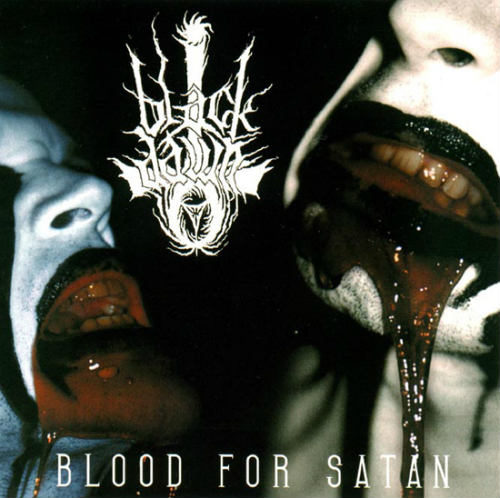
"Blood for Satan", 2001
S. : Les concerts de True Black Dawn ont été rares ces dernières années. Avec la sortie du nouvel album, vas-tu entreprendre une ou plusieurs tournées ?
Wrath : Ils ont toujours été rares. Nous n’avons fait que 13 concerts depuis 1992, six d’entre eux l’ont été dans les années qui ont suivi Blood for Satan. Nous ne jouons pas souvent en live non seulement pour ne pas se lasser nous-mêmes, mais également pour que le public conserve un intérêt à notre égard. La répétition est un poison pour la créativité et je ne souhaite pas réitérer les mêmes singeries sur scène deux fois par mois, comme je l’avais fait avec Enochian Crescent. Je tiens à offrir au public autre chose qu’un groupe lambda qui joue ses morceaux machinalement, et cela ne serait pas possible si nous nous produisions trop fréquemment. C’est pour cette raison que nous ne ferons pas de tournée non plus.
S. : Aura-t-on l’opportunité de te voir sur les planches françaises ?
Wrath : Si une opportunité se présente à nous, nous ne voyons pas d’objection à venir jouer ici.
S. : Abordons des sujets plus personnels. Durant les 15 ans de hiatus qui séparent les deux reliques, quels ont été les principaux changements humains qui ont opéré en toi ?
Wrath : Il y a eu la phase expérimentale, dont OBC fait partie, et qui a consisté à faire voler en éclat ce que j’étais et à me reconstruire en partant de rien. Elle a été suivie d’une phase destructive qui s’est accrue avec le temps, jusqu’à la fin d’Enochian Crescent. Tout cela m’a beaucoup marqué physiquement. Je suis devenu de plus en plus introverti et j’ai vieilli, aujourd’hui je me retrouve dans une phase d’isolement. Vivre avec deux statues est une situation parfaite pour quelqu’un qui apprécie le silence. Plus je prends de l’âge, plus la présence des gens m’insupporte. Raison de plus pour éviter cess cloaques que certains appellent les ”bars”.
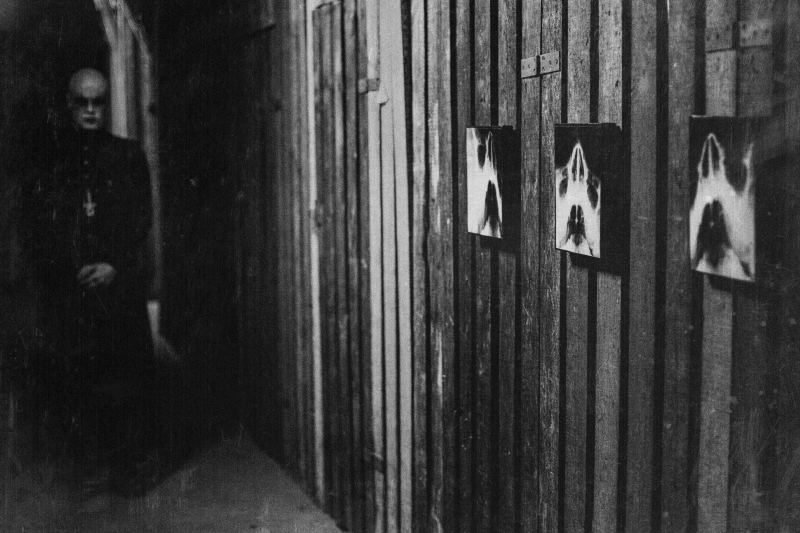
Wrath
S. : Une question que je pose régulièrement : chacun a sa vision personnelle de ce qu’est et ce que doit être le Black Metal. Quelle est la tienne ?
Wrath : Le Black Metal n’est pas un genre conventionnel, il est davantage défini par l’idéologie que par la musique. Tu peux prendre certaines libertés avec cette dernière, mais si la première n’est pas là, ce n’est pas du Black Metal. C’était particulièrement vrai dans le temps, quand l’idéologie était la seule chose qui réunissait des groupes comme Necromantia, Beherit, Mayhem et Master’s Hammer. Mais naturellement, cela nécessite de construire une certaine atmosphère pour délivrer le message correctement.
Je ne pense pas non plus que ce genre ait quelque chose à voir avec la politique, puisque par définition il tourne surtout autour de la destruction, plutôt que de se faire porte-parole d’une nation meilleure.
S. : Quels projets de la scène finlandaise recommanderais-tu à nous, lecteurs français ?
Wrath : Le dernier EP de Cornigr ”Funereal Harvest” et les trois albums de Desolate Shrine sont des réalisations que je recommande aux aficionados qui recherchent quelque chose de plus sinistre.
S. : Certaines personnes pensent que rien n'est lié au hasard, d'autres penses au contraire que tout n'est qu'une succession d'événements découlant de probabilités mathématiques. Que représente la notion de Dieu pour toi ?
Wrath : Il n’y a pas de dieu, ni de destin et encore moins d’au-delà. C’est la signification de la croix d’Ankh inversée dans notre logo : arrêter de croire à ce conte de fée qui promet une vie heureuse après la mort et mettre le sceptre de Seth avant tout. La plus grande force est de pouvoir vivre sans l’illusion de faux espoirs et accepter que dans le grand schéma des choses nos vies ne réprésentent rien du tout.
Merci à Olivier pour la traduction et Leviathan pour m'avoir soufflé quelques questions.
ENGLISH VERSION
S. : Hail Wrath. First of all thank you for giving us this interview. Let’s get straight to the point. The new True Black Dawn album has been released May 17th, and we have reviewed it in our pages (HERE). As far as you’re concerned, how would you describe it?
Wrath : "There is a pleasure in the pathless woods. There is a rapture on the lonely shore. There is society, where none intrudes. By the deep sea, and music in its roar. " - Lord Byron
S. : There is a 15-year gap between “Blood For Satan” and the new album. Why is that? What happened in the meantime?
Wrath : After Blood for Satan we released the Boogeyman Unbound EP in 2006 as a part of OBC collection. The EP was actually recorded in 2003 with Syphon and BFS line-up, but due to some issues it took a while to get it out. We also recorded a couple of songs in 2008 with another line-up, which were never physically released. In addition, I was active with Enochian Crescent until 2012, that naturally had an effect on BD.
I guess the scarcity of releases can make it seem like the band had been defunct until now, eventhough we never quit. There have been several different line-ups since Blood for Satan, some of which didn't work that well in the long run. That's been the biggest issue in the past. After EC ended we decided with Syphon, who had rejoined the band, to become more active, and bring new blood to the group.
S. : What gave you the motivation to write a new True Black Dawn album? Has it been a 15 years long process or were you expecting some sort of epiphany before starting to write new songs?
Wrath : We started creating the material for the album in the summer of 2012. Shortly after VnoM joined the band, and when we finally found a rehearsal place via the guys from Lie in Ruins. After that obstacle had been removed, and we started rehearsing in Helsinki, things started to move at a quicker pace. Well, at least by BD's standards, considering the whole process took us four years, including the cover art.

"Come the Colorness Dawn", 2016
S. : In terms of writing, what are the main differences between the two albums? I mean, is this the same man, with the same state of mind, that wrote both opuses or does each album address a separate facet linked to your personal motivations of the moment?
Wrath : Apart from the 12 years between the recordings, the difference is that BFS was composed by Gaunt, whereas this album was composed by Syphon and VnoM. The influences and intentions were different as well, both musically and lyrically. A lot has happened during the years. The naivety of youth has given place to something darker, that's more capable of crawling under the skin.
BFS was more black and white thematically; a singular hatred spewing outwards. This album is layered in grey; a cold void drawing ashes inwards. Both portray different aspects of the same beast.
S. : "Come the Colorless Dawn" appears less brutal than his predecessor, more melodic and mature. It is relatively close to what Behexen or Watain do. To what extent these Orthodox Black bands have an influence on you?
Wrath : I don't consider neither of them an influence, but I do consider Behexen as our long-time brothers. Both of us have been doing our own thing since the beginning. We stand on slightly different grounds ideologically, but we have always supported each other throughout the years.
I think nuances and opposites make everything more interesting and effective. When there are more layers to the darkness, it's easier to get lost within the depths.
S. : The quality of production is one of the highlights of this album, which is not surprising given that it was recorded at Necromorbus Studio (Armagedda, Funeral Mist, Ondskapt...). Why did you choose this renowned studio? A desire to have a more meticulous production?
Wrath : It was actually recorded at our rehearsal place with the help of LL of Desolate Shrine, who also mixed the album. The freedom the approach brought worked well for us, but also contributed on lengthening the process. We chose Necromorbus for mastering due to their history, and the quality presented therein.
S. : Your new opus is released by World Terror Committee. It looks almost logical considering that bands produced by the German label fit into the spirit of your band. How did you get in touch with them? Did they get in touch with you or is it the other way around?
Wrath : We sent three pre-mixed songs to a handful of labels in 2014, and WTC was one of those that was interested in releasing the material. The guys from Horna also helped with securing the deal with them. We couldn't be happier about uniting with a label like WTC, who made the grand vision we had for the covers of the album possible. It's an honour to be a part of their roster.
S. : "Blood For Satan" is a very spontaneous album with fearsome intensity which exhales hate and embraces the darkness. Fifteen years later, what are your thoughts on this album considered as "cult" by many?
Wrath : We made the kind of black metal album we had wanted to hear at the time, that would speak to us on a primal level. The very same applies to the current album. It's a very important part of our history, but it's not what defines us. Throughout the years I have noticed that people put a great emphasis on Blood for Satan, when it's merely a blip in our history of 24 years. The BFS period only lasted three years between 1998-2001, and we have made five demos, an EP, and now another album on top of that. I imagine those who have only heard that one album might think it's what the band is all about, but in reality all of our releases have sounded different from each other. Personally, I have always find it more interesting to evolve, instead of doing the same over and over again. That's why our intention never was to make BFS vol.2, even as much as some might have expected it from us. It's already been done, and we don't wish to repeat ourselves.

"Blood for Satan", 2001
S. : True Black Dawn gigs have been rare in recent years. With the release of the new album, are you going to undertake one or more tours?
Wrath : They have always been rare. We have played 13 gigs in total since 1992, six of them during the years after BFS. We play live pretty rarely in order to keep it interesting for ourselves and the audience. Repetition is poison to creativity, and I have no desire to return to performing the same antics onstage on bi-monthly basis, like I did with EC. I wish to offer something else than just a band playing the songs, and that wouldn't be possible if we played live frequently. That's why we won't be doing tours either.
S. : Will we have the opportunity to see you in France?
Wrath : If a good opportunity comes ahead, we would have no objections against coming to play there.
S. : Let's talk about more personal things. What have been the main human shifts you experienced during the 15 years separating the two albums?
Wrath : There was the experimental phase, where the OBC collection belongs to, that involved shattering what I was and assembling myself anew. It was followed by a destructive phase that increased throughout the years, and lasted until EC ended. Memories of it are etched on my body. I've become increasingly introverted as I've grown older, which is why the current phase revolves around isolation. Living with two mannequins is perfect for a person who enjoys silence. The older I get the more the presence of people vexes me. All the more reason to avoid the cesspools, that some call bars.

Wrath
S. : This is a regular question of mine: everybody has a very personal vision of what is Black Metal and what it should be. What’s yours?
Wrath : Black metal is not a conventional genre, as it's more defined by the ideology than the music. You can have liberties with the latter, but if the former isn't there it is not black metal. That was particularly true in the early days, when the ideology was the only thing that united bands like Necromantia, Beherit, MayheM, and Master's Hammer. Naturally, it also demands a certain kind of atmosphere to convey the message properly.
I don't think the genre has anything to do with politics either, as it's by definition centered around a more destructive point of view, instead of campaigning for bettering the nation.
S. : What Finnish projects can you recommend to our French readers?
Wrath : Cornigr's Funereal Harvest EP and Desolate Shrine's three albums are something I can recommend to fans of a more sinister kind of metal.
S. : Some people think there's no such thing as luck. On the contrary, some others think that life is nothing more that a chain of mathematically probable events. What does the concept of God mean to you?
Wrath : There is no god, fate, or afterlife. That's what the inverted ankh in our logo has always stood for; renouncing the fairytales of happy everafters, and setting the staff of Set on top. The greatest strength is to live without the crutches of false hope, and accept that in the grand scheme of things our lives mean diddly-squat.
Thanks to Olivier & Valentin for translation and Leviathan for some questions.







